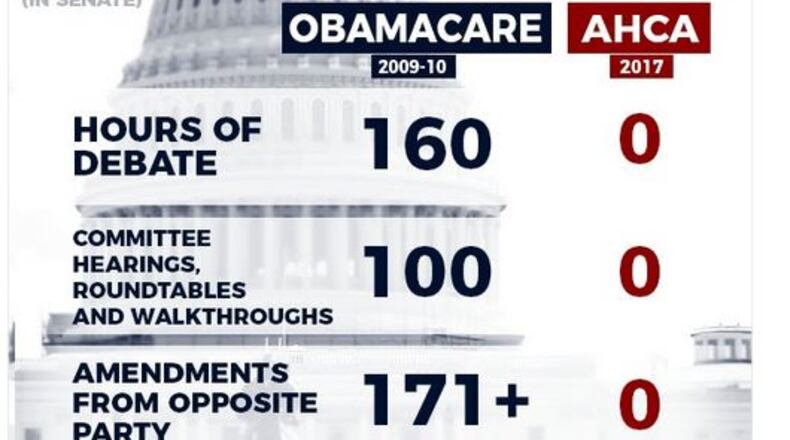PolitiFact last week found Jon Ossoff's assessment of an impact of Republicans' health care bill went too far. So did Karen Handel in saying Iran has violated the 2015 nuclear deal. And Sen. Bernie Sanders was also off in his comparison of Democrats' and Republicans' allowing debate on Obamacare and its proposed replacement. Here are abbreviated versions of our fact checks. Full versions can be found at www.politifact.com.
The House Republican health care bill “guts protections against massive price hikes for Georgians with pre-existing conditions.”
— Jon Ossoff on Thursday, June 8th, 2017 in a debate
The GOP’s health care bill allows states to use two approaches that could affect people with pre-existing conditions. States could let insurance companies base rates on a person’s health status, and they could trim the list of health services every plan must offer.
No one can say for sure how this would play out. The Congressional Budget Office, the nonpartisan analytic arm of Congress, estimated one-sixth of Americans would live in states that chose both to trim health services required and to let insurers charge sicker people more. In those places, the CBO said “less healthy people would face extremely high premiums, despite the additional funding that would be available.”
Health policy analyst Joe Antos at the American Enterprise Institute, a market-oriented think tank, said no one knows which states would ask for waivers, much less whether Georgia would. Also unknown is how states would change the rules for insurance companies.
Our ruling
Ossoff pushed too far on the specifics for Georgia.
We rate this claim Half True.
Says Iran has “violated the terms of the (nuclear) deal.”
— Karen Handel on Thursday, June 8th, 2017 in a debate
The prevailing view among foremost authorities is that Iran has complied. The International Atomic Energy Agency has primary monitoring responsibility, and it has repeatedly found Iran in compliance with the terms of the agreement. The U.S. State Department, which is required to report to Congress every 90 days on Iran’s compliance, also certified in April that the Islamic Republic is living up to its end of the deal.
The Handel campaign zeroed in on two infractions Iran committed. Iran has twice crept over its allowed limit of “heavy water,” a modified liquid used in some nuclear reactors. Some experts we spoke to said Iran has tried to create wiggle room by interpreting parts of the agreement to favor its own interests. But the consensus is that saying Iran has violated the deal overstates the case.
Our ruling
The IAEA, the foremost authority on the matter, has repeatedly deemed Iran in compliance with the deal. The State Department has also. Experts said minor breaches of the limit on heavy water posed no practical risk of moving Iran closer to developing a nuclear weapon, and said such infractions should not be interpreted to mean Iran has not complied with terms of the deal.
We rate Handel’s statement Mostly False.
Says Senate deliberations on the Affordable Care Act in 2009 and 2010 included hundreds of hours of debate and more than 100 Republican amendments, compared with zero for the American Health Care Act this year.
— Bernie Sanders on Tuesday, June 13th, 2017 in a tweet
A graphic Sanders tweeted said Democrats crafting the Affordable Care Act allowed 160 hours of debate; 100 “committee hearings, roundtables, or walkthroughs”; and more than 171 amendments from the opposite party. He accuses Republicans now of allowing none of those things.
On the hours of debate, Steven S. Smith, a political scientist at Washington University in St. Louis, said the numbers seem broadly accurate. But Sanders cherry-picks a time frame on the 2017 debate that prevents an equitable comparison. He compares a completed bill with one that hasn’t advanced very far in the process. It’s a case of comparing apples and oranges.
Senate Republicans intend to bring the bill now being written directly to the floor once it’s analyzed for cost and impact by the Congressional Budget Office. That would mean bypassing the typical committee process. But if they take the course now planned, there would be 20 hours of floor debate. That is is significantly less than the 160 hours on the Affordable Care Act, but not the zero Sanders suggested.
Our ruling
Democrats in 2009 and 2010 included more active involvement by Republicans than Republicans are allowing in the current debate. But it’s misleading for Sanders to make this point through an apples-to-oranges comparison that will soon be rendered out of date.
We rate the statement in the image Half True.
About the Author
Keep Reading
The Latest
Featured


